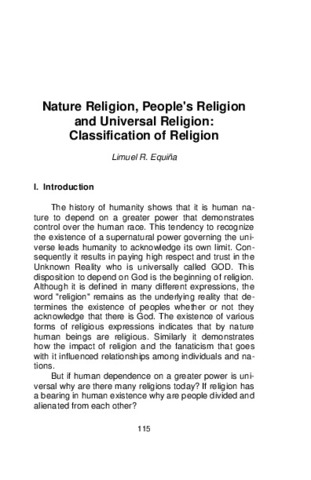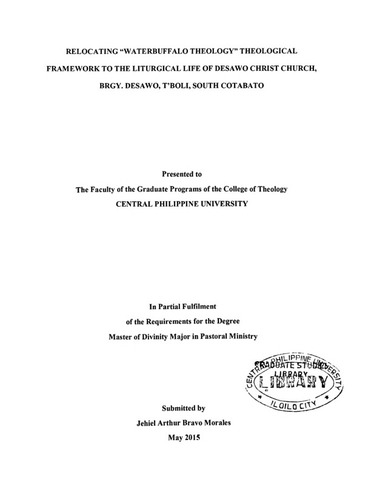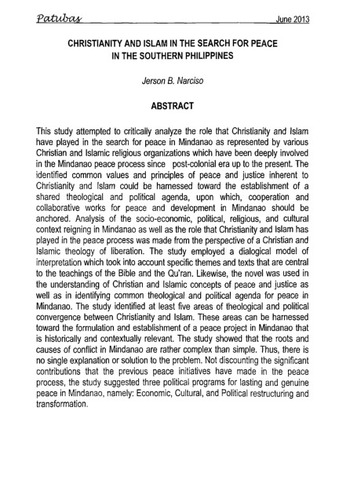Nature religion, people's religion and universal religion: Classification of religion
| dc.contributor.author | Equiña, Limuel R. | |
| dc.date.accessioned | 2022-01-19T06:17:59Z | |
| dc.date.available | 2022-01-19T06:17:59Z | |
| dc.date.issued | 2005 | |
| dc.identifier.citation | Equiña, L. R. (2005). Nature religion, people's religion and universal religion: Classification of religion. Journal of Theology, 1, 115-140. | en_US |
| dc.identifier.uri | https://hdl.handle.net/20.500.12852/1874 | |
| dc.description | Journal article | en_US |
| dc.description.abstract | The history of humanity shows that it is human nature to depend on a greater power that demonstrates control over the human race. This tendency to recognize the existence of a supernatural power governing the universe leads humanity to acknowledge its own limit. Consequently, it results in paying high respect and trust in the Unknown Reality who is universally called GOD. This disposition to depend on God is the beginning of religion. Although it is defined in many different expressions, the word "religion" remains as the underlying reality that determines the existence of peoples whether or not they acknowledge that there is God. The existence of various forms of religious expressions indicates that by nature human beings are religious. Similarly, it demonstrates how the impact of religion and the fanaticism that goes with it influenced relationships among individuals and nations. But if human dependence on a greater power is universal why are there many religions today? If religion has a bearing in human existence why are people divided and alienated from each other? This paper attempts to answer the above questions on the basis of the evolution of the following classification of religions, namely, Nature Religion, People's Religion and Universal Religion. | en_US |
| dc.language.iso | en | en_US |
| dc.publisher | Institute of Advanced Theological Studies (IATS) and College of Theology | en_US |
| dc.subject.lcsh | Religion | en_US |
| dc.subject.lcsh | Religions | en_US |
| dc.subject.lcsh | Animism | en_US |
| dc.subject.lcsh | Religious pluralism | en_US |
| dc.subject.lcsh | Pluralism--Religious aspects | en_US |
| dc.subject.lcsh | Religions (Proposed, universal, etc.) | en_US |
| dc.subject.lcsh | Christianity | en_US |
| dc.subject.lcsh | God | en_US |
| dc.title | Nature religion, people's religion and universal religion: Classification of religion | en_US |
| dc.type | Article | en_US |
| dc.citation.firstpage | 115 | en_US |
| dc.citation.lastpage | 140 | en_US |
| dc.citation.journaltitle | Journal of Theology | en_US |
| dc.citation.volume | 1 | en_US |
| dc.citation.issue | 1 | en_US |
Fichier(s) constituant ce document
Ce document figure dans la(les) collection(s) suivante(s)
-
Journal articles [28]
-
Journal of Theology [24]
A joint publication of the Institute for Advanced Theological Studies (IATS) and College of Theology, Central Philippine University





